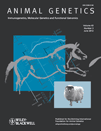
GENETICS SELECTION EVOLUTION
metrics 2024
Exploring the Depths of Selection Mechanisms
Introduction
GENETICS SELECTION EVOLUTION is a prominent open-access journal published by BMC since 1989, situated in the United Kingdom. With a focus on evolutionary genetics and the mechanisms of selection, this journal serves as a pivotal platform for researchers, professionals, and students in the fields of Animal Science, Ecology, and Genetics. Notably, it has achieved remarkable rankings, being categorized in Q1 for various disciplines, reflecting its high impact and contribution to scientific discourse. The journal boasts an impressive recognition in the Scopus rankings, sitting at the 94th percentile in Animal Science and Zoology, and 86th percentile in Ecology and Evolution, underscoring its influence in these domains. Offering open access since its inception, it ensures broad dissemination of knowledge, allowing critical research findings to reach a wider audience. As we converge into its upcoming issues, the journal continues to foster the exploration of innovative genetic research and selection processes, shaping the future of evolutionary studies.
Metrics 2024
 1.02
1.02 3.60
3.60 4.10
4.10 87
87Metrics History
Rank 2024
Scopus
IF (Web Of Science)
JCI (Web Of Science)
Quartile History
Similar Journals

Rice
Exploring groundbreaking findings in rice production and management.Rice, an esteemed journal published by Springer, is at the forefront of scientific research in the fields of Agronomy, Plant Science, and Soil Science. With its ISSN 1939-8425 and E-ISSN 1939-8433, the journal offers open access since 2012, ensuring that vital research findings are widely accessible to researchers, professionals, and students globally. Based in the United States, the journal has established itself as a pivotal resource, reflected in its impressive rankings—Q1 across multiple categories in 2023, including Agronomy, Plant Science, and Soil Science. With Scopus rankings positioning it in the top tiers of agricultural and biological sciences, Rice continues to foster innovative dialogue and advances in agricultural research. The journal's objectives focus on disseminating high-quality research that contributes significantly to the understanding and sustainable management of rice production, supporting global food security and agricultural practices. Researchers in this domain will find Rice to be an invaluable resource for cutting-edge findings and collaborative opportunities.

ZUCHTUNGSKUNDE
Empowering the future of breeding and genetics.ZUCHTUNGSKUNDE is a distinguished journal published by EUGEN ULMER GMBH CO that has been advancing the field of animal science and zoology since its inception in 1977. With its ISSN 0044-5401 and E-ISSN 1867-4518, this journal provides a vital platform for researchers, professionals, and students in the realms of animal genetics, breeding, and veterinary studies. Although currently categorized in the fourth quartile for both Animal Science and Zoology and Food Animals, ZUCHTUNGSKUNDE serves as an essential resource for sharing innovative research findings and methodologies. Located in Stuttgart, Germany, the journal is strategically positioned to foster collaboration within the European agricultural and biological sciences community. Researchers are encouraged to contribute their insights to enhance the understanding of breeding practices and improve animal welfare and productivity. Despite its challenges, ZUCHTUNGSKUNDE remains committed to addressing key issues within its scope, paving the way for future advancements in animal science.

ANIMAL GENETICS
Illuminating Genetic Pathways in Animal ResearchANIMAL GENETICS, published by WILEY, is a leading journal in the fields of Animal Science and Zoology, with a commendable Q1 classification for 2023, reflecting its critical role in advancing research and knowledge in animal genetics. Established in 1986, this journal has become a cornerstone for professionals, researchers, and students alike, providing a platform for innovative research that explores the genetic underpinnings of animal biology. With an ISSN of 0268-9146 and an E-ISSN of 1365-2052, it boasts a significant impact in both agricultural and biological sciences, as indicated by its ranking of #74 out of 490 in its category on Scopus, positioning it in the 85th percentile for Animal Science and Zoology. Readers can access high-quality, peer-reviewed articles that not only illuminate current advancements but also foster future research directions. While currently not an open access journal, ANIMAL GENETICS remains vital for anyone engaged in the exploration of genetics and its applications in medicine and beyond, with a continual commitment to publishing findings that shape the future of animal breeding, conservation, and genetics research.

Vavilovskii Zhurnal Genetiki i Selektsii
Exploring New Horizons in Agricultural GeneticsVavilovskii Zhurnal Genetiki i Selektsii, with ISSN 2500-0462 and E-ISSN 2500-3259, is a distinguished open-access journal published by the Russian Academy of Sciences, Institute of Cytology and Genetics. Since transitioning to open access in 2013, the journal has been dedicated to advancing research and discourse in the fields of genetics and selection, particularly within agricultural and biological sciences. With a current ranking of Q2 in Agricultural and Biological Sciences and Q3 in Biochemistry, Genetics and Molecular Biology according to Scopus, it serves as a pivotal platform for researchers, professionals, and students to disseminate their findings and collaborate on innovative ideas. The journal, housed in the vibrant academic environment of Novosibirsk, Russia, publishes a diverse range of articles that contribute to the ongoing evolution of genetic studies and practical applications in agriculture. Its commitment to quality and accessibility ensures it plays an essential role in the global scientific community, fostering knowledge that bridges theoretical research and practical implementation.

Evolution Letters
Exploring the intricate dance of ecology and evolution.Evolution Letters is a premier Open Access journal published by Oxford University Press, dedicated to advancing research in the interdisciplinary fields of Ecology, Evolution, and Genetics. Since its launch in 2017, this journal has rapidly established itself as a leading platform for high-quality research and innovative studies, as reflected by its impressive Q1 quartile rankings in both Ecology, Evolution, Behavior and Systematics and Genetics for 2023. With a remarkable Scopus ranking placing it in the top 3% in its categories, Evolution Letters serves as a vital resource for scholars and practitioners seeking to understand the complexities of evolutionary processes and genetic developments. The journal’s commitment to Open Access ensures that groundbreaking research is freely available to the global scientific community, fostering collaboration, discovery, and progress in these critical fields of study.

Genome Biology and Evolution
Unlocking the Secrets of Genomes and Their EvolutionGenome Biology and Evolution, published by Oxford University Press, is a leading open-access journal that has been instrumental in advancing research in the fields of genetics and evolutionary biology since its inception in 2009. With an impressive Q1 ranking in both Ecology, Evolution, Behavior and Systematics and Genetics in 2023, the journal is recognized for its high-quality publications that contribute significantly to the understanding of genomic processes across diverse organisms. As part of its commitment to disseminating impactful research, it is dedicated to fostering interdisciplinary collaboration among scientists and providing a platform for innovative findings. Researchers, professionals, and students alike are encouraged to explore the wealth of knowledge within its pages, contributing to ongoing discussions that shape our understanding of evolutionary mechanisms and genomic data interpretation. With its robust access options and a strong commitment to wide dissemination of research, Genome Biology and Evolution remains an essential resource for anyone engaged in the life sciences.

Evolutionary Biology
Bridging Disciplines in the Study of Life's DiversityEvolutionary Biology is a distinguished academic journal published by Springer, focusing on the intricate fields of ecology, evolution, behavior, and systematics. This journal, with the ISSN 0071-3260 and E-ISSN 1934-2845, has established itself as a critical platform for cutting-edge research and innovative ideas that shape our understanding of biological evolution and its implications. Operating from Germany, it ranks in the Q2 quartile in its category for 2023, placing it in the top tier of journals recognized for quality and impact, with a Scopus rank in the 66th percentile among its peers. Despite not being Open Access, this journal ensures comprehensive dissemination of knowledge essential for researchers, professionals, and students passionate about evolutionary studies. With a publication history tracing back to 1993 and converging years up to 2024, Evolutionary Biology continues to significantly impact the academic landscape, fostering dialogue and collaboration across various disciplines within the biological sciences.

Mammal Research
Fostering Collaboration in Mammal Research ExcellenceMammal Research, published by Springer Heidelberg, is a prominent academic journal dedicated to advancing knowledge in the fields of Animal Science, Zoology, Ecology, Evolution, and Behavior. With an impressive Q2 ranking in both Animal Science and Zoology and Ecology, Evolution, Behavior and Systematics as of 2023, this journal is an essential resource for researchers and professionals seeking to publish innovative findings that contribute to our understanding of mammalian biology. The journal operates under an Open Access model, allowing a wide audience to access and engage with high-quality research articles. Converging between 2015 to 2024, Mammal Research serves as a vital platform for scholarly discourse, promoting rigorous scientific inquiry and collaboration among experts and students alike in the fascinating study of mammals.

THEORETICAL AND APPLIED GENETICS
Connecting theoretical frameworks with practical solutions in genetics.THEORETICAL AND APPLIED GENETICS, published by Springer, is a premier journal that has significantly contributed to the fields of Agronomy, Crop Science, Biotechnology, and Genetics since its inception in 1933. With a solid reputation reflected in its Q1 ranking across multiple disciplines for 2023, this journal provides a vital platform for the dissemination of high-quality research that advances our understanding of genetic principles and their applications in agriculture and biology. The journal's indexed status and high impact factor indicate its vital role in shaping contemporary genetic research, marking it as an essential resource for researchers, professionals, and students seeking to stay at the forefront of these dynamic fields. Although it currently does not offer Open Access options, the journal ensures that quality studies are accessible through institutional subscriptions, supporting an informed community of scientists dedicated to innovation in genetics and applied biological sciences.

INDIAN JOURNAL OF GENETICS AND PLANT BREEDING
Driving Progress in Agricultural GeneticsIndian Journal of Genetics and Plant Breeding, ISSN 0019-5200, published by the Indian Society of Genetics and Plant Breeding, serves as a pivotal platform for research in the fields of genetics and plant breeding. Based in India, this journal provides valuable insights into the latest developments, methodologies, and findings that drive innovation and enhance the agricultural landscape. With a convergence period extending from 2008 to 2024, this journal maintains a strong focus on advancing our understanding of genetic mechanisms in plants, contributing significantly to both academic circles and practical applications in agriculture. Although presently ranked in the fourth quartile for Genetics and the third quartile for Plant Science, the journal aims to elevate its impact factor and enhance visibility among research communities through rigorous peer-reviewed articles. Published in both print and online formats, the journal is accessible to a global audience and emphasizes the importance of open communication in fostering scientific advancements. Researchers, professionals, and students alike will find this journal an essential resource for staying abreast of trends and breakthroughs in genetic research and plant breeding.